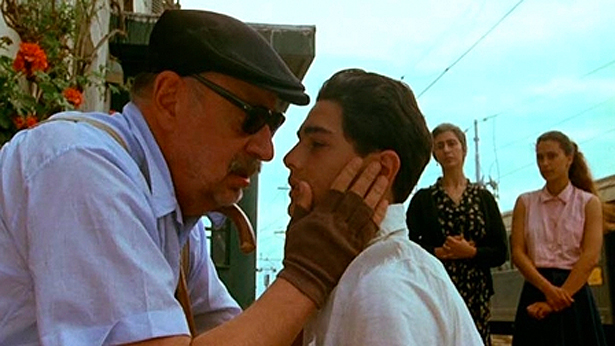Several days ago we saw Cinema Paradiso at the House of Italy. Clearly the film centers on the relationship of projectionist Alfredo with Salvatore (Toto), both as child and as adolescent. A question that always comes back to me is why Alfredo insists so forcefully that the adolescent Salvatore leave and never return and never contact him again. Equally critical is the question why does Salvatore listen to Alfredo.

What precisely is wrong with village life in the Sicilian town that makes Alfredo so determined to force Salvatore out? And what knowledge does he have that somehow Toto shares with him such that Alfredo’s insistence is not personal rejection?
Of course, in the longer version we might say it’s the forbidden crossing of class lines that makes this town seem so backward looking or repressive, but then that version never was the popular one. The popular version does not go into much detail about class lines preventing Salvatores’ romance. And yet here we have Alfredo, on the beach with his quiet but determined friend, for once speaking his own words, insisting Toto leave, never return, never contact him again.
Is this rejection of the Sicilian village and its society simply an anomaly in a film everyone sees as nostalgic? Is this demand that Salvatore never return really a good foundation for what every critic feels is just a feel-good movie about the good old days of glorious film and about the supposedly integrated world that makes our present-day atomised world seem like an alien insane asylum?
Clearly the village we see at the end of the film, Paradise crumbling in preparation for a parking lot, the beautiful piazza now jammed with buses, cars and jumbled arrays of junk, seems to be a paradise lost. So maybe Alfredo was prescient, maybe he saw the end coming. But I don’t think so.
The hard core of this movie is the work done by Alfredo, the projectionist, work that made him central to the village life but work that also destroyed him, an industrial labor that was incidentally infected with the romance of story-telling through pictures. What Alfredo knows is that he is not the one telling the stories and that the romance can be cut out, even if young Toto can conjure it up in single frames in his kitchen. Would Alfredo like to be the story-teller? You bet. That’s what binds Toto and Alfredo. Could he be? Not in a million years, this sweet, enduring peasant. And Toto? What of him? Could he ever grow into a story-teller in this village?
His initial attempts at this story-telling in high school seem perilous and ineffective, more an effort to capture some glimmer of his love, a keepsake of romance, than telling a story of love.
Life in this village, no matter what year, is always going to be edited, class differences will always be enforced, even in Paradise, and Toto will never have the opportunity to tell his own stories. Is this not the story of almost all Italian emigration?

And yet what does Salvatore accomplish by leaving? Is he around to save the Cinema Paradiso? Does he carry with him the places and people he was once so much a part of? He seems to trade in a donkey cart for a huge Mercedes, he seems to have lost most enduring social connections, he does not seem able to maintain a relationship with a woman for any amount of time, or at least not longer than the period between his mother’s phone calls.
This is not really a nostalgic movie. Rather it is an effort to make history somehow knowable. I see it finally as a look at how stories are made and what makes a story-teller. Someone at a very young age, bright, clever, mischievous, daring, tests all the boundaries and discovers that relationships and character can be represented in glorious ways, edited to eliminate some kinds of glory, but ultimately told in ways that make life sit still for a moment and engage in an entirely different kind of work, the work of remaking images, the work of Eros.
And the means for telling a story is what Alfredo gives Toto. The love and affection they share is the recognition each has in the other that stories are essential to their lives and that perhaps there is nothing else they could work at. So Alfredo tolerates the mischief and Toto tolerates the industrial misery so that each can participate in Toto’s education. But Toto, now Salvatore, can not go further in his education in his home town. And Alfredo can not accompany Salvatore in his work because Salvatore will become a story teller and Alfredo will not. Alfredo’s work is done, there on the beach. It is likely, though, that Salvatores’ work can not really begin until he returns home to recognize something important about himself, about his relationships and about his obligations to that part of the past he loved – that story telling is real work not just for the story teller but also for those who come to the story. That without that notion of shared work Salvatore as a director may not be more than the projectionist, simply stuffing someone else’s stories into the film guides. But Salvatore as a director, as a real story teller, may be able to capture something about the meaning of Alfredo’s work and make it as important for others as it was and still is for him.
The movie is not a glorification of the past, nor is it a condemnation of the present. It is about the limits of Toto’s education and the need for Salvatore to finish his own education, not just about his work as a story teller but also about the parts of his life that have been either edited by someone else or unknowingly by him. This is a direction we find elsewhere in Tornatore, but that’s another discussion.


Hi guys:
I’m totally ignorant about the blogosphere, so I’m probably not submitting this correctly, but here goes…
I left before the discussion began following Cinema Paradiso, and I asked Victor what I had missed. My feeling about the movie the second time around was totally different from when I first saw it quite a few years ago. This time the sentimentality did not appeal to me. It was a beautiful film, lovingly shot, and quite amusing, BUT Toto was a horrible little boy, a lovesick adolescent and nothing much as an adult. His walk down memory lane didn’t really move me. The only characters that were a bit more than caricatures were Alfredo and the mother. So I left feeling “so what?” Part of this could have been due to the uncomfortable chairs at the HOI and my miserable sinuses, but did anyone else share my feelings?
Karen